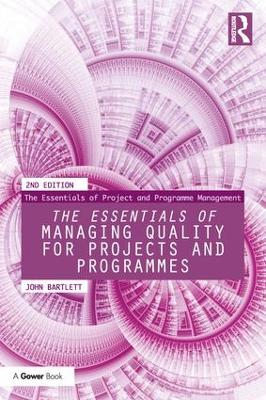The Essentials of Project and Programme Management
3 total works
The Essentials of Managing Risk for Projects and Programmes is an indispensable, practical guide to the steps that lead to success in managing risk.
Risk management is particularly important for projects and programmes, since they all carry varying degrees of risk. The combination of uniqueness, constraints, assumptions, stakeholder expectations, changing environment, and human behaviour all conspire to make projects and programmes risky ventures. Rather than presenting new theories or techniques or tools, John Bartlett offers down-to-earth guidelines and proven methods to respond to risk appropriately.
Pick up and use this concise, intensely practical guide to develop a shared understanding, shared language and shared purpose across project managers, programme managers, sponsors, risk managers, project and programme board members and associated stakeholders in all your projects and programmes.
The Essentials of Managing Quality for Projects and Programmes
by John Bartlett
This indispensable handbook details the practical steps that can lead to success in programme management. Accelerating change has demanded that companies and organisations use programme management methods and techniques to effect it. John Bartlett provides the benefit of his deep involvement in managing large-scale change, where his advice and guidance have proved successful for both the private and public sectors of commerce and industry.
The book is compatible with several existing frameworks, not least the UK government’s Managing Successful Programmes approach. It is arranged without cumbersome theory but presents just the essentials needed for good practice. The Essentials of Managing Programmes is recommended reading in many universities and the Association for Project Management.
Pick up and use this concise, intensely practical guide to develop a shared understanding, shared language and shared purpose in all your programmes; across project managers, sponsors, programme board members and all those involved in or affected by organizational transformation.
The Essentials of Managing Programmes is an indispensable, applied guide to success in realising the benefits associated with delivering business strategy and change.
John Bartlett opens with the purpose and application of programme management in the context of the business or organization. He explains how to organise for programmes, including the roles of the key players involved; how to design and establish a programme office. Three chapters cover the core elements of risk, benefits and governance.
To help you think strategically, the author builds on soft systems thinking (Peter Checkland 1981) to visualise and communicate the dynamic nature of change and encourage employee involvement.
Pick up and use this concise, intensely practical guide to develop a shared understanding, shared language and shared purpose in all your programmes; across project managers, sponsors, programme board members and all those involved in or affected by organizational transformation.


